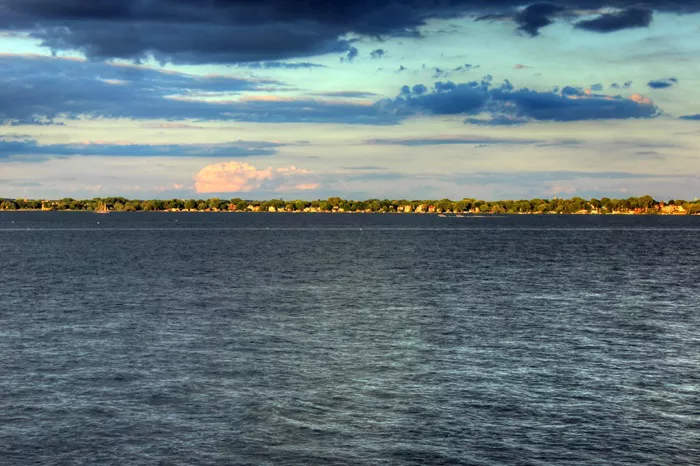Lake Mendota is the largest of the four lakes surrounding Madison, Wisconsin. It covers about 9,740 acres and reaches depths of up to 83 feet. The lake forms part of the Yahara River chain and is a focal point for both natural beauty and cultural history in the region.
Nestled within Dane County, this freshwater lake is renowned for its ecological significance, recreational value, and connection to academic research. The lake is often referred to as “Wisconsin’s most studied lake,” due to decades of environmental monitoring and scientific exploration.
Historical Importance
Native American Heritage
Before European settlers arrived, the Lake Mendota region was inhabited by Native American tribes such as the Ho-Chunk Nation. Archaeological finds, including burial mounds, confirm their presence and reverence for the area. These indigenous peoples depended on the lake for fishing, transportation, and spiritual practices.
European Settlement and Development
European settlers began arriving in the early 19th century. The city of Madison was founded in 1836 and developed along the shores of Lake Mendota. The lake played a vital role in the city’s early infrastructure and economy, including transportation via steamboats and the harvesting of ice during winter.
A Center for Scientific Research
University of Wisconsin–Madison
The University of Wisconsin–Madison borders the southern shore of Lake Mendota. It uses the lake as a living laboratory for scientific research. Studies here date back to the 1870s, making Lake Mendota one of the most scientifically documented freshwater bodies in North America.
Limnology, the study of inland waters, is a major field of research. The Attractions of ongoing scientific exploration include temperature shifts, algae blooms, and the impact of climate change.
Lake Mendota Buoy System
To aid in data collection, researchers installed a buoy system equipped with sensors. These measure water temperature, oxygen levels, and clarity in real time. The findings contribute to broader ecological models and environmental policy discussions.
Recreational Activities
Boating and Sailing
Lake Mendota is a popular destination for boating and sailing. Several marinas and launch sites make it easy to access the water. The Mendota Yacht Club, founded in 1903, is one of the oldest inland yacht clubs in the United States.
Fishing Opportunities
Fishing is a major draw. The lake hosts a variety of species, including walleye, northern pike, bass, and panfish. Both casual anglers and competitive fishers frequent the lake throughout the year, with ice fishing being a winter tradition.
Swimming and Beaches
Beaches such as James Madison Park and Governor Nelson State Park offer swimming and sunbathing during the summer months. Lifeguard services and amenities make these locations ideal for family outings.
Winter Activities
Ice Fishing and Skating
During winter, the lake freezes over and transforms into a playground for ice fishing, skating, and even cross-country skiing. Local residents build ice shanties and spend hours fishing in the frozen calm.
Snowkiting and Other Sports
Snowkiting, a winter version of kite surfing, is gaining popularity. Using kites to glide across the snow-covered ice, enthusiasts find Lake Mendota to be a perfect open space.
Ecological and Environmental Significance
Flora and Fauna
Lake Mendota supports a diverse array of aquatic life. Submerged plants help maintain oxygen levels and provide habitats for fish. Above the surface, birds such as herons, eagles, and ospreys are commonly seen.
Invasive Species and Management
Like many lakes, Lake Mendota faces challenges from invasive species. Zebra mussels and Eurasian watermilfoil are among the threats. Ongoing management efforts aim to control their spread and mitigate ecological damage.
Surrounding Attractions and Parks
Governor Nelson State Park
Located on the north shore, this park offers hiking, bird watching, and lake access. It is a popular spot for picnics and outdoor recreation. Trails provide scenic views of the lake and city skyline.
James Madison Park
This urban park lies near downtown Madison and provides public access to the lake. It features volleyball courts, grills, and open green space for social events and relaxation.
Nearby Travel Destinations
Lake Mendota is centrally located, making it an ideal starting point for trips to other Wisconsin destinations. Visitors can explore the state’s capital, enjoy regional breweries, or take short drives to forest preserves and historic towns.
Events and Festivals
University Events
The University of Wisconsin often hosts regattas, environmental symposiums, and student celebrations on and around Lake Mendota. These events add energy and vibrancy to the lakefront.
Seasonal Celebrations
During warmer months, concerts and food festivals are held near the lake. In winter, community events focus on ice activities and warm beverages shared around bonfires.
Climate and Best Time to Visit
Seasonal Variations
Spring and summer are ideal for boating, fishing, and hiking. Autumn offers beautiful foliage, while winter transforms the lake into a snowy expanse for cold-weather sports.
Safety and Water Quality
Water quality is generally safe, thanks to consistent monitoring. Still, swimming advisories are sometimes issued during algal blooms. Visitors should check local guidelines before entering the water.
Lake Mendota in Popular Culture
Literary and Artistic Mentions
Lake Mendota has been featured in poetry, photography, and local music. It has inspired generations of artists and writers living in or visiting Madison.
Academic and Research Media
The lake frequently appears in documentaries and research publications related to limnology and climate studies. It is often cited in environmental science coursework and lectures.
Local Culture and Community Connection
Gathering Space
Lake Mendota is more than a scenic landmark. It is a communal gathering space for residents and students alike. Events, protests, celebrations, and casual meetups frequently occur along the shoreline.
Civic Pride
Madisonians take great pride in their lake. Community clean-up efforts, conservation programs, and educational outreach help preserve its beauty and accessibility.
Conclusion
Lake Mendota is a multifaceted treasure. It combines natural beauty, scientific significance, and recreational value. From boating and fishing to research and conservation, the lake touches many aspects of life in Madison. Whether you’re a scientist, tourist, or local resident, Lake Mendota offers a meaningful and memorable experience year-round.
Plan your visit today and discover why Lake Mendota continues to captivate and inspire.

